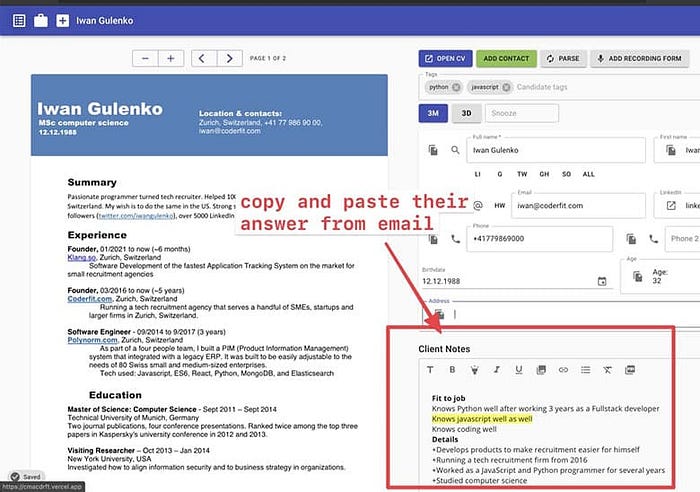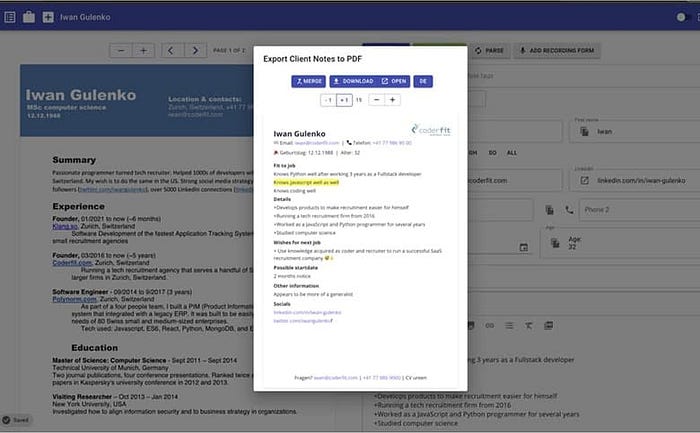Recruitment agencies: What is your added value?
What is the biggest added value of agency recruiters? If you ask me, it’s de-risking candidates on behalf of the clients. Depending on how long you have been in recruitment you may reply to me:

Well, yeah, you could say that, or you could try to put yourself in the clients’ shoes and understand what they want and why they are willing to pay you: they want to talk to risk-free, motivated candidates.
One way to do this is by documenting and communicating your candidate assessments such that the clients save significant time. As a result, they will work closer with you and less so with other agencies. I can tell from experience.
Do CVs cover all there is to know about a person? Of course not. Yet I see that most recruiters forward “naked” CVs to clients and hope it suffices. Anyone who has ever hired anyone knows that there are many things that come to light when you talk to the person.
Developers, in particular, lack both the skills and desire to make a CV that covers all there is to know about them. This is both a problem and an opportunity for you as a recruiter. It is a problem, because you need to talk to the candidate, which costs time and needs skill, it is also a chance to stand out by being the only recruiter who actually does some kind of basic assessment.
I see recruiters writing long blocks of texts with flowery fluffed up language praising the candidate as some genius. No one wants to read CVs. And, for sure, no one wants to read made up fantasy prose about how good some candidate is.
Stating something negative about the candidate will actually give you extra credibility. It’ll show that you don’t try to oversell a profile or try to trick the company into interviewing a bad fit. (By the way, this also helps with candidates; tell them also what is bad about the client, not only the good things.)
No matter what you write down in your notes, write something. When I started recruitment, I asked myself what the best format would be for this. A bullet point list, question/answer style is most readable; it can be visually skimmed even by the most time-constrained, lazy client.
My must-haves include:
- Current location/how long does a trip to the work location take? This was more relevant in pre-covid times but is still relevant just because labour laws apply where the person lives and some firms can’t just randomly hire people from another country or don’t want to hire someone from a far away timezone.
- Which work locations are ok?/willingness to move and reason for it. Clarify the motivation to move, ask this several times. That point often makes or breaks a deal. People say they want to move, then later state at the last minute that they don’t want to move after all; find out the truth here by asking the same question from different angles.
- How much experience in years in each stack? (.net, java, frontend, react angular, other). The person likely has this somewhat mentioned on their CV, but double-check. Example: “Two years in Java, Three years frontend, React”. This sums up the main points for your client better than most CVs.
- Most recent experience. Ask about the specialisation in the last 2 years, for instance “70% Java, 30% Javascript/React”; that would be a fullstack developer with backend focus.
- Stack the person wants to work with or job they want to have. Gauge for strong wishes to work for something entirely else than what they used in the past. Sometimes people have strong preferences and the client should take this into account. If you manage to include this, both candidate and client will thank you for it.
- Possible startdate. Especially in Europe some people have three months notice; that means, if a candidate decides to leave their job on March 30, they’d legally be allowed to start a new job only on July 1. Some firms want to hire quicker than that, so that is relevant.
- Salarywish (yearly all in). An obvious one, the possible salary range given by the client and stated by the candidate should somewhat overlap. Here you have to check if the candidate gives you fantasy numbers or if they actually want to earn what they say. Will the person accept a lower salary given perks like frequent remote work or when they find out another cool detail about the firm? It is your job as a recruiter to find out.
- Other interviews. I use this information as a proxy to find out if someone is seriously looking or more of a passive candidate. I share this with the client if I think it helps to push the candidate’s case.
- Motivation/Reason to change jobs/move to *work location*. This is similar to the question before, I ask this several times just to be sure, because it is such a big risk. Especially in Europe people do move for jobs a lot. Clients usually hate relocating people, especially from other countries. Yet, there are good reasons to move and bad reasons to move. Good reasons are “my life partner lives there/found a job and I join them”, bad reasons are “I apply in 40 different locations and this one looks like you can make a lot of money”. Or: What is it that the old job lacks that they seek in the new job? Maybe your clients offer exactly what the person is missing now!
- Links to online profiles to look at (links to github, linkedin). Your job as a recruiter is to gather all the relevant information about the candidate in one place. Social links often aren’t even clickable on CVs. Repeat them here and make them easily accessible. (Some genius candidates even just put their Github nickname, without a link, thinking that is a convenient way to find them but people forget if the right link is github.com/nickname or github.com/users/nickname or what it is again; given the fact that most hiring managers won’t take longer than 20 seconds to read a candidate profile, your job as a recruiter is to make the notes so clear that the hiring manager can just click, click, click and have 3 tabs open with relevant information about a person.)
- Level of languages relevant to the job / willingness to learn / already taking courses? Can you follow a business conversation? In Switzerland, knowing German opens you to double the job opportunities. Even English-speaking firms often care about the person integrating well overall. Your job is to find out if the person knows the language on a level where others don’t need to switch to English. Here I even sometimes add recordings to prove my point that the candidate feels comfortable with relevant languages. (klang.so has a build-in function for recording candidates.)
- Comments on jobhopping. If a person held positions less than 2 years, two to three times in a row, this raises questions. Most people have good answers like relocation or bankruptcies. A less worrying point is if someone stayed somewhere longer than 10 years; then, firms also want to know why they want to change jobs after such a long time.
- Any kind of uni degree? This is more important to some firms and less important to others.
If possible, I ask all questions via an email but sometimes I’ll ask all this on the phone. I decide this case-by-case. Gathering all this on the phone is way more time-consuming but worth it with more senior, passive candidates because some won’t reply in writing.
If the candidate obviously strongly wants the job, I try to make them answer first in by email and use that as a basis for a phone call. For instance, if people are actively looking for a job, they answer these things very well in writing. Developer candidates sometimes also prefer written communication. I will send the above mentioned talking points to the candidates as questions and let them reply back to me. I ask people explicitly to not answer with things like “see CV” or leave points empty.
The quality of the answers can be so good that I only need to copy paste it in my klang.so ATS and generate a full profile with the questions and answers merged as a PDF which can be sent directly to the client.


Most often, however, I need to clarify a few things and I do that via a phone call, also to build rapport.
Some of this info might be already in their CV / Linkedin but you want to make sure that you get the most up-to-date facts about them. Remember how much your clients are paying you. Sometimes A LOT right? So, in order to survive in this business we need to put in the work.
(When I started as a recruiter, I still had the developer-habit of always writing emails. I did my first placements with people I had never spoken to on the phone! I thought I would distinguish myself as a recruiter who never forces synchronous communication but now I understand that the phone is a necessary evil to do business. A phone call will make your notes about candidates a hell of a lot better).
Why have all this effort? Well, maybe that is a Swiss thing, but my clients expect that I answer open questions about my candidates before they arise. For instance, if a person has lots of job hops they want me to explain why, without them having to ask for it. Some clients have a small team of 2–3 people as in-house HR staff who need to look at 400 profiles a week. They can’t waste time.
I had clients who got a profile from another recruiter, rejected it and only because of my notes they interviewed the person. More than once a hire resulted from that. Think about it, good notes vs. bad notes could make the difference between making a placement and not making it.
As my friend Hung Lee once said, hiring is about de-risking. I never forgot that and try to put myself into my clients shoes and help them de-risk. I get rewarded with jobs to fill and loyalty. *knock on wood*
No available ATS on the market allowed me to integrate note-taking with candidate submissions; so, we decided to build our own. We released a demo that you can access here: klang.so
If you have questions, feel free to ping me also on iwan@klang.so or +41 77 986 90 00.
Originally published at https://klang.so on June 4, 2021.
If you like my writing style, you might also enjoy:
- Why software engineers don’t get jobs: Four horror stories
- How to be less depressed as a recruiter: Treat work more like a craft
- As a web developer, should you switch to a more niche field?
- Five years after moving to Switzerland. Why I am still here
- Nine reasons why I moved to Switzerland to work in tech
- Switzerland: How buying real-estate can kill you financially and two reasons to go for stocks instead
